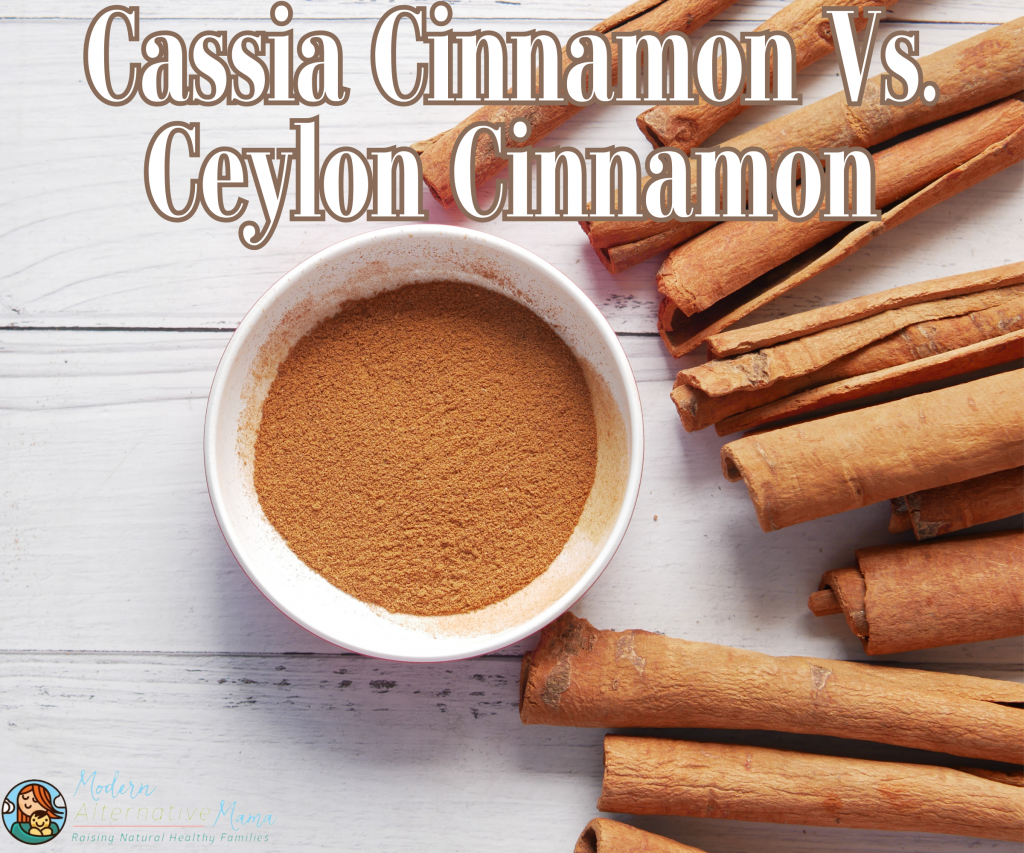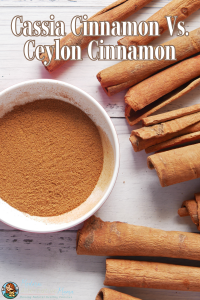Cinnamon. We’ve all heard of it and likely all have it in our homes right now. Cinnamon is a popular spice made from the bark of cinnamon trees. Cinnamon dates back to 2800 BC when it was used for anointment, embalming, and various ailments. Back then, cinnamon was rare and valuable, often regarded as a gift fit for kings in Ancient Egypt (1). Despite cinnamon’s historical use, did you know there is more than one kind of cinnamon, and one can actually be harmful to your health?
Cassia Cinnamon Vs. Ceylon cinnamon
The two common types of cinnamon are cassia and Ceylon. Cassia, or regular cinnamon, is the most common variety found in supermarkets. Cassia can be harmful in large amounts, while Ceylon cinnamon, or “true” cinnamon, is brimming with health benefits. Let’s take a deeper look at the differences between the two types of cinnamon.
Cassia Cinnamon
Cassia cinnamon or Cinnamomum aromaticum comes from the Cinnamomum cassia tree, native to East and South Asia (2). Cassia tends to be a dark brown-red color with a thicker, coarser texture with scroll-like sticks and a stronger, more bitter flavor (3).
Historically, cassia cinnamon has been used in Chinese medicine (4). Today cassia is more commonly used for cooking, especially savory dishes. Cassia has a few medicinal benefits, like antimicrobial, anti-inflammatory, and antihyperglycemic properties (5,6,7). Aside from these benefits, some risks are associated with cassia, especially when using large doses, like making medicine.
Cassia contains high levels of coumarin, about 7-18 milligrams per teaspoon (8). Toxicology and risk assessments demonstrate a tolerable daily intake of about 0.05 mg of coumarin per pound of body weight (9). In other words, 7.5 mg of coumarin is the tolerable daily intake for a 150-pound person, yet a teaspoon of cassia cinnamon contains upwards of 18 mg.
We’ve all seen the liver-damaging effects of acetaminophen, but did you know cassia cinnamon can be just as harmful? Consuming too much coumarin can be detrimental to liver health, inducing liver toxicity and damage (10,11). It doesn’t take long for cassia cinnamon to induce liver damage. In one case study, an older woman developed a sudden liver infection, including liver damage, after one week of supplementation (12).
Aside from liver damage, cassia cinnamon’s high levels of coumarin may also increase the risk of cancer. In animal studies, consuming too much coumarin has resulted in the development of cancerous tumors in the liver and lungs (13,14). Although the cancer-causing properties of coumarin have only been studied in animals, some scientists believe over time, coumarin can damage human DNA, increasing the risk of cancer (15).
Interestingly, cassia cinnamon is regulated or banned in other countries (16). Meanwhile, the FDA banned coumarin as an additive in the United States, but cassia cinnamon is not regulated (17). Although cassia is much cheaper and is considered safe in moderation like food, I recommend using Ceylon cinnamon, especially when making medicine.
Ceylon Cinnamon
Contrarily, Ceylon cinnamon or Cinnamomum zeylanicum comes from the Cinnamomum verum tree, originating in Sri Lanka and Southern India (14). Ceylon tends to be a dark brown-tan color, a less coarse texture with perfect circle-shaped sticks, and a sweeter flavor (3).
First and foremost, Ceylon cinnamon contains trace amounts of coumarin (7). In other words, no need to worry about liver damage or increased risk of cancer. If you read our cinnamon herbal profile, you’d know Ceylon is brimming with health benefits you won’t want to pass up, like:
- Rich in antioxidants
- Antibacterial properties
- Antifungal properties
- Antiviral properties
- Anti-inflammatory properties
- May help control diabetes and blood sugar levels
- May promote heart health
- May improve brain health
Aside from all these amazing benefits, Ceylon has anti-cancer properties, unlike cassia, which may increase cancer risk. Although the evidence is limited to test-tube and animal studies, studies suggest that cinnamon extracts have anti-cancer properties (15,16,17). In vitro, cinnamaldehyde reduced the growth and spread of ovarian cancer cells (18). In animal studies, cinnamaldehyde blocked the expression of certain proteins involved in cancer growth in mice with ovarian cancer (19). A final study concluded that cinnamaldehyde is a potential novel drug for treating and preventing breast cancer (20).
Like always, it’s important to understand the safety profile of herbs, even if it is a natural substance like cinnamon. With that said, let’s go over the basics regarding Ceylon cinnamon. Surprisingly, the mainstream has no major concerns about cinnamon. They warn of irritation, allergies, low blood sugar, and their potential to affect how some medications work (22).
According to trusted herbalist Richard Whelan, cinnamon in food, beverages, or herbal extracts isn’t problematic for any age, pregnancy, breastfeeding, etc. However, cinnamon as an essential oil or a concentrate needs to be treated with great caution as there is a real and high possibility of allergic reactions of the skin or mucous membranes. This is most likely because of the cinnamic aldehyde, which is known to be a potent contact sensitizer (23).







